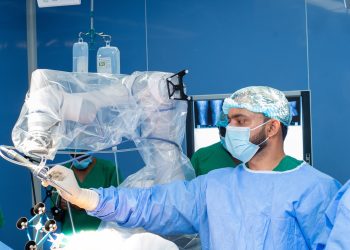By Purity M. Thuku
Kenyatta National Hospital rolled out a kidney transplant program to ease burden and high demand for dialysis.
Dr. John Ngigi, the head of the Renal Unit at KNH said the program caters for 2-3 patients per week, observing that dialysis is getting clogged up and a declined uptake of transplant patients recorded.
He noted a recurring medical tourism phenomenon where patients in need of kidney transplant travel abroad for treatment and follow-up care.
“Patients should take advantage of this program instead of seeking the same services abroad. At KNH we have the services and the technology needed to meet a successful procedure,” he said.
He also said that NHIF should cater for the lifelong immunosuppressant needed after the transplant, given that their cost ranges from Sh40, 000 to Sh50, 000 per month.
The adoption of immunosuppressive therapy is intended to suppress the immune system to prevent the rejection of the transplanted organ. This is because despite different temporal dynamics there is a 10-15 percent risk a rejection will occur. Currently, NHIF covers Sh500, 000 for kidney transplant.
“We are pleading with NHIF to consider pumping more funds into post-transplant medication, otherwise people who cannot afford the drugs are at risk of having failed kidneys to which they will then come back to dialysis,” said Ngigi.
Kidney donations from the family of the patient have become a commonplace medical event in Kenya. Behind this medical triumph, however, lies a fundamental problem. Donors are scare, with most family members not able to donate due to hereditary diseases such as diabetes and cystic illnesses. Robust legal frameworks, Ngigi said, are required to accommodate donors who are not in the family line.
He was careful to note that the success rate of kidney transplant in KNH is at 95 percent.
“NHIF is paying half a million for the transplant procedure and covers dialysis fully. This has pushed patients to prefer the free alternative,” Ngigi said
He noted that about 200 patients seek dialysis services at KNH, of which two sessions are covered by NHIF per week at Sh9,500.
The KNH acting Chief Executive Officer, Dr. Evanson Kamuri said the kidney transplant project at the facility aims at increasing access to transplantation and creating awareness of the increasing burden of kidney disease in the country.
“We are happy of the quality of the outcome because the 1-5 year survival has not been comparable to any other center in the world in terms of graft and patient survival,” he said.
The hospital management acknowledges that the engagement of doctors and other staff is of crucial importance to the process.
“I wish to emphasize that the KNH management is committed to the implementation of several landmark projects to realize our vision of ‘A world-class patient-centered specialized hospital,” Kamuri said.
The CEO said the hospital aims at providing high quality services aspiring to be a leader in the region and the epicentre of patient satisfaction.
Kamuri said this would be achieved through the establishment of new structures, investment in modern equipment, and introduction of new specialities.
Globally, kidney disease risk factors include HIV, diarrheal ailments, malaria, and low birthweight. The risk factors span the life-course and lifestyle aetiologies.
Identifying these risks early can avert the worsening of kidney function through inexpensive interventions.
Accelerated by genes and modifications in lifestyle, kidney disease has been reported to increase at an alarming rate in Kenya.
Although it is considered a comorbidity of hypertension and diabetes, kidney disease presents multiple complex causes.
End-stage renal disease alone has been reported to pose an indirect impact on global mortality and morbidity.
A 2017 study by the Ministry of Health estimates that 4 million Kenyans have kidney disease, and about one in every 10 people has chronic kidney disease (CKD) progressing to kidney failure.
Acute kidney injury (AKI) is a significant driver of CKD affecting more than 13 million people across the globe. Attributed to reduced glomerular filtration rates, at least 4.8 million Kenyans may be suffering from the disease by 2030, notes the study.
According to the Kenya Renal Association, the number of patients on chronic haemodialysis in both public and private hospitals shot from 300 in 2006 to 2400 in 2018.
In the first quarter of 2018, Kenyatta National Hospital received 2 Continuous Renal Replacement Therapy Machines (CRRT), to combat the ever-increasing rate of renal and nephrological disorders.
CRRT is multi-therapeutic, a program that was flagged off for the treatment of multiple organ failure, lupus, sepsis, and trauma all of which play a role in kidney failure.
The National Health Insurance Fund (NHIF) according to the benefits package utilization report paid Sh64.7 million in 2018 towards kidney transplant.
This was an increase from the previous Sh21.7 million in 2017, making the procedure the topmost expenditure item in the healthcare benefits package.














